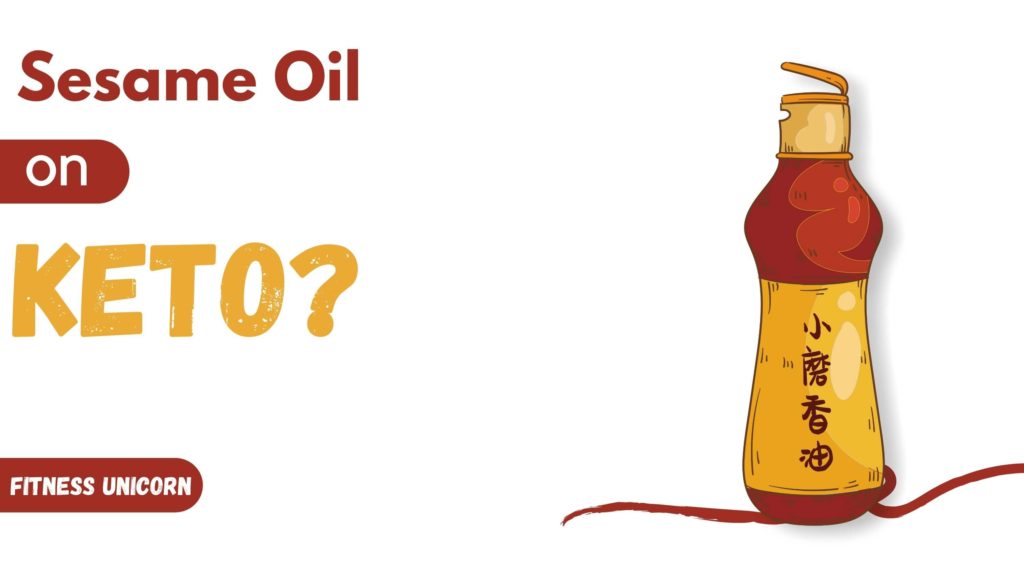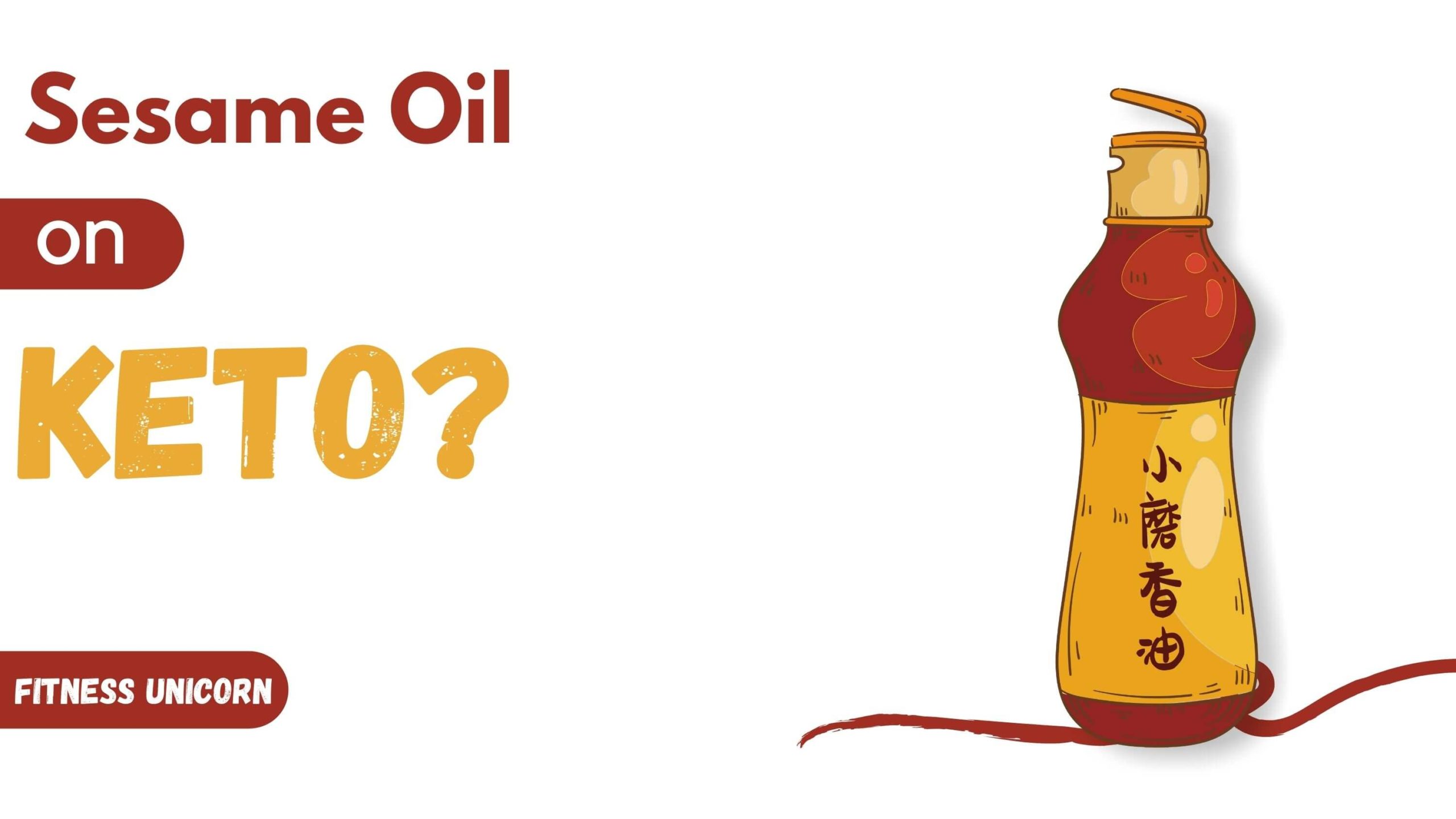So you are pursuing the high fat-low carb-diet and wondering about various cooking oils. But is Sesame oil keto?
If you think that all fats and oils are equal on the keto diet, you couldn’t be further from the truth!

You see, fats are the major components of a keto diet and we often think that any fat source would do the job.
While it’s true that any kind of fat will keep you in ketosis (within carb limit!), but the type of oil you choose will greatly impact your well being and the quality of ketosis!
Oils are the backbone of any keto cooking or any cooking for that matter. Whether you are frying, baking, greasing, your food, oils are the most versatile option in hand.
In fact, oils are highly used in a keto diet to amplify the fat content and boost your levels of ketosis!
But before we judge the keto friendliness of sesame oil, let’s find out the right metrics we need to look at.
These are the characterstics that make an oil keto-friendly:
- Smoke Point: It should survive high temperatures without disintegrating into toxic substances
- Healthy Fats: It should be a source of healthy and natural fats
- Flexible: It should gel well with other keto dishes and recipes, e.g. a salad
It’s widely known that MCT oils are great for a keto diet because they enhance ketosis, but is Sesame oil keto?
MORE: Is Buttermilk Keto?
Is Sesame Oil Keto Approved?
Sesame oil is a keto friendly oil as it has healthy fats and zero carbs. However, it contains Omega-6 fatty acids which might disintegrate into toxic by-products at high temperatures.
Sesame oil adds a delicious flavor to asian recipes like stir-fry or pad-thai, when used sparingly. It has a very strong flavor and just a few drops will do the job!
I absolutely love its fragrance and it has a special place in every zoodles dish I make. I prefer the toasted sesame oil because it has a more intense flavor with fewer amounts.
Even if you are doing strict keto, which involves having no processed foods, sesame oil can definitely get a place in your kitchen! It is made with cold pressing the sesame seeds, which is a completely natural process.
Sesame oil is highly rich in antioxidants and has the perfect amounts of MUFAs and PUFAs to rejuvenate your health. It provides a lot of anti-inflammatory benefits and strengthens your immunity.
There are two types of sesame oil: Light sesame oil and dark sesame oil. Generally, people use the light one for cooking purposes and the darker one for flavoring (because it is more intense).
So if you decide to use sesame oil on keto, make sure you use it as a flavoring agent and not expose it to high temperatures. Le me put it this way: Sesame is just a flavoring oil and not a cooking oil!
Importance of Oils in Keto
Out of all the macros in the equation, fats dominate all the meals in a keto diet. And oil is essentially the synonym for fat!
That said, it’s important to know that not all fats are created equal. In fact, most of the conveniently available oils (like soybean oil) are highly processed and contain a lot of trans fats. It may increase your risk of heart disease or increased inflammation.
Your ideal cooking oil on a keto diet should have a small number of saturated fats and more polyunsaturated and monounsaturated fatty acids.

Unsaturated fats are generally derived from veggies, nuts, seeds and seafood. Oils that are rich in unsaturated fats are a source of good fats.
They are known to be a healthy source of fats as they lower blood pressure, boost weight loss, fight inflammation, and also lower the bad cholesterol from your system. Unsaturated fats also enhance heart health and reduce the risk of heart disease.
The benefits of good quality cooking oils are not only limited to health. Keto-friendly oils like avocado oil help you supplement your fat consumption and boost your levels of ketosis.
For example, adding some roasted sesame oil to your keto stir-fry can greatly increase fat consumption, without putting in any extra effort.
READ: Is Cassava Keto?
Best Oils for Keto Cooking
Choosing the right kinds of oils can give you a ton of health benefits and amplify your ketosis.
If you came here wondering is sesame oil Keto, this section is also very important as I provide you with other alternatives that can simplify your Keto life.
The best keto oils are nutrient-rich having sufficient vitamins, antioxidants, saturated fats, and monounsaturated fats.
These are some of the best and pure sources of fat on a ketogenic diet:
- Coconut Oil
- Extra Virgin Olive Oil
- Grass-Fed Butter
- High-Oleic Sunflower Oil
- Ghee
- Avocado Oil
Coconut Oil
Coconut oil is one of the best cooking oils on keto. It’s award for the best oils is likely due to the fact that its very high in MCTs.
MCTs is the new hot topic in the world of health and fitness, especially keto. A common example is people putting MCT oil in their bulletproof morning coffee.
MCTs are essentially the medium-chain triglycerides that behave differently in the body as compared to other sources of fats. In simple terms, it means that these fats have much shorter chain of carbon atoms as compared to the common sources of fats.
So how does this benefit keto, you may ask.
You see, the shorter the chain of carbon atoms, the faster a fat can be digested by the body. Hence MCTs are quickly absorbed by the body and kickstart ketosis as compared to other sources of fats with long-chain triglycerides.
MCTs provide an instant release of energy as compared to traditional fats. They are easily available in markets online and offline. But since they it is sold as a dietary supplement, it has a premium price tag attached to it.
This is where coconut oil comes in to play. It is much more chapter than the MCTs available in the market and provides the same effect of enhanced ketone levels in the blood.
When compared to sesame oil on a keto diet, coconut oil has a longer shelf life and doesn’t even break down in fairly high temperatures. It can be used for frying, baking, or greasing. You can even replace butter with coconut oils in your keto fat bomb recipes.
Extra Virgin Olive Oil
Similar to Sesame oil on keto, extra virgin olive oil (EVOO) is also not suitable for cooking as it has a low smoke point. However, recent studies have found that it does not break down even while frying.
Since there is conflicting data from various researches, I’d say it’s best to stick to lower temperatures and use it in salads or similar dishes.
But don’t let that stop you from getting this superfood into your kitchen cabinet!
EVOO is high in monounsaturated fats (MUFAs) which provide a ton of health benefits along with boosting ketone production. On top of it, virgin olive oil is also a good source of vitamin E and other antioxidants.
It is also a cold-pressed oil and hence you should buy it fresh. Olive oil has a tendency to go rancid after 12-13 months of manufacturing.
I highly recommend Oleum Viride or California Olive Ranch if you are from the U.S.
Olive oils make a killer salad dressing and they can also be used to sauté keto-friendly veggies. You could also sprinkle it on freshly prepared keto meals to amplify fat content.
(Recommended: Is Premier Protein Keto?)
Avocado Oil
Surprisingly enough, avocado oil has a smoke point of more than 520 F, making it the most suitable keto cooking oil. You can use it hesitation free for frying your chicken steaks!
Avocado oil is a rich source of MUFAs and antioxidants and it is also one of the most versatile keto cooking oils.
It doesn’t taste as extreme as sesame oil and you can use it for different purposes like frying, grilling, searing, or simply enjoying it as a salad dressing.
It can enrich your diet with vitamins A, E, and D, along with proteins and potassium.
However, avocado oil is much more expensive and hence it’s best to stick with coconut oil or EVOO if you are on a tight budget.
Grass-Fed Butter
Butter is naturally the second thing that comes to mind when I hear “keto”!
It is one of the best keto foods because of a substantial fat profile. Butter is also a common ingredient of many fat bombs because it is a quick and easy fat solution on keto.
Grass-fed butter is obtained from the milk of cows that are fed with high amounts of grass. It is an enhanced butter with a more solid nutritional profile, hence it is better for your health.
Grass-fed butter is a healthy source of MUFAs, carotenes, vitamin B12, vitamin A and omega-3 fatty acids.
Butter is rich in saturated fats but also MUFAs, carotenes, and vitamin B12. Studies show that grass-fed butter is higher in important omega-3 fatty acids, vitamin A, and antioxidants than conventional butter.
Butter has a smoke point of 350 F which is much lower as compared to avocado oil. However, you can still use it for baking, spreading, and greasing.
High-Oleic Sunflower Oil
Do not confuse this one with the traditional sunflower oil which is quite high in polyunsaturated fats.
High-oleic sunflower oil gets its name due to the high amount (above 80%) of oleic acid it contains. Oleic acid is a source of monounsaturated fats which is a good kind of fat on keto.
One of the major differences between the traditional sunflower oil and the high-oleic variant is that the latter can be made with cold-pressing without any processing.
High oleic sunflower oil is free from trans fat and has a very mild taste. Its fat profile is similar to olive oil, while being cheaper at the same time.
Ghee
Ghee is a type of butter which is even more clarified that the classic clarified butter. It is made by extracting water and milk solids from the butter.
Ghee originated from India but now it is commonly found in west households as well, thanks to its modern publicity. Ayurveda documents the anti-inflammatory and therapeutic properties of ghee that made it so famous.
In a keto lifestyle, Ghee can be used in various ways such as frying, greasing, and baking. Homemade ghee has a shelf life of more than 15 months.
Even if you are sensitive to dairy, ghee will be fine with your stomach since all the lactose and casein are removed while preparing ghee. The removal of water from butter also gives a high smoke point to ghee (465 F as compared to 320 F of butter).
Keto Oils to Avoid
Keto diet is a road trip with fat acting as fuel for your car! However, not all fats are created equal.
Since we have talked about the best oils for keto cooking, it’s time we also discuss the worst ones!
What makes them worst is the fact that they are either high in polyunsaturated fats or they contain hydrogenated oils. Here’s a detailed list of keto cooking oils to avoid:
- Margarine
- Corn oil
- Soybean oil
- Safflower oil
- Grapeseed oil
- Rice bran oil
- Sunflower oil
- Cottonseed oil
- Canola oil
- Vegetable oil
(PS: High-oleic variants of sunflower oil and safflower oil fit well into the keto diet as they have more than 80% monounsaturated fats.)
Also Read: Is Beef Jerky Keto?
Tips for Consuming Fats the Right Way
I hope you are now equipped with the right knowledge of the types of oils on the keto diet.
Now I’m going to tell you how to combine this knowledge with the consumption of fats and make the most out of your keto diet!
Here are some personal tips that have shaped my success on keto and they’re going to make your life much easier:
Oils vs Food
Now that you the importance of oils on a keto diet, you should also note that consuming more oils won’t compensate a low-fat diet.
It simply means that you should obtain the majority of high-quality fats from real food like meats, nuts, fish, vegetables, and use oils only as a supplement.
Even though oils are rich in fats, they lack other necessary nutrition and fiber that is required for the day-to-day functioning of your body. In essence, I mean that simply drinking a glass of sesame oil won’t help keto in any way, lol.
If you ask me for more actionable advice, I’d say that your pure fat or oil consumption should not be more than 5 tbsp per day.
Avoid Hydrogenated Oils on Keto
Having a lot of polyunsaturated fats can be detrimental to your health. Hydrogenated oils and refined oils are loaded with polyunsaturated fats and hence they should be used sparingly, only when required. However, one exception, in this case, could be the toasted sesame oil, which can be used in tiny amounts (only for flavoring).
You should instead focus on oils that have more than 80% of monounsaturated + saturated fats. Some of the examples include extra-virgin olive oil, avocado oil, and MCT oil.
Get Enough Polyunsaturated Fats
In this article, we discussed the rich benefits of polyunsaturated fats. But if you have read so far, you know that I highly discourage the use of cooking oils high in polyunsaturated fats.
The reason for such a hypocritic guideline is that only a few components of these polyunsaturated fats actually benefit your health. DHA and EPA are the only two kinds of polyunsaturated fats you need more.
The rest of them commonly found in hydrogenated cooking oils are not very healthy for your body!
So how do you derive the numerous health benefits offered by these types of fats?
The answer is quite simple: Have more sources of omega-3 and omega-6 in your diet like eggs, meat, dairy, nuts, seeds, and vegetables.
Conclusion
Is Sesame Oil Keto?
Sesame oil is a natural and cold-pressed keto-friendly oil. You can use it in your keto recipes to enhance their flavour and add more fats to your diet. However, make sure you don’t expose it to high temperatures as it can disengrate into toxic substances.
Sesame oil can be a great addition to salads, stir-frys, and other keto-friendly dishes. Other keto-friendly oils include avocado oil, coconut oil, extra virgin olive oil, MCT oil, grass-fed butter, high-oleic sunflower oil, and ghee.

